Leadership and Management at Vodafone UK: Styles, Theories, and Impact
VerifiedAdded on 2023/06/10
|14
|4459
|476
AI Summary
This report explores the different leadership and management styles and theories adopted by Vodafone UK and their impact on decision-making and organizational performance. It discusses the link between organizational structure and leadership and management styles. The report also provides recommendations for motivational strategies and implementation.
Contribute Materials
Your contribution can guide someone’s learning journey. Share your
documents today.
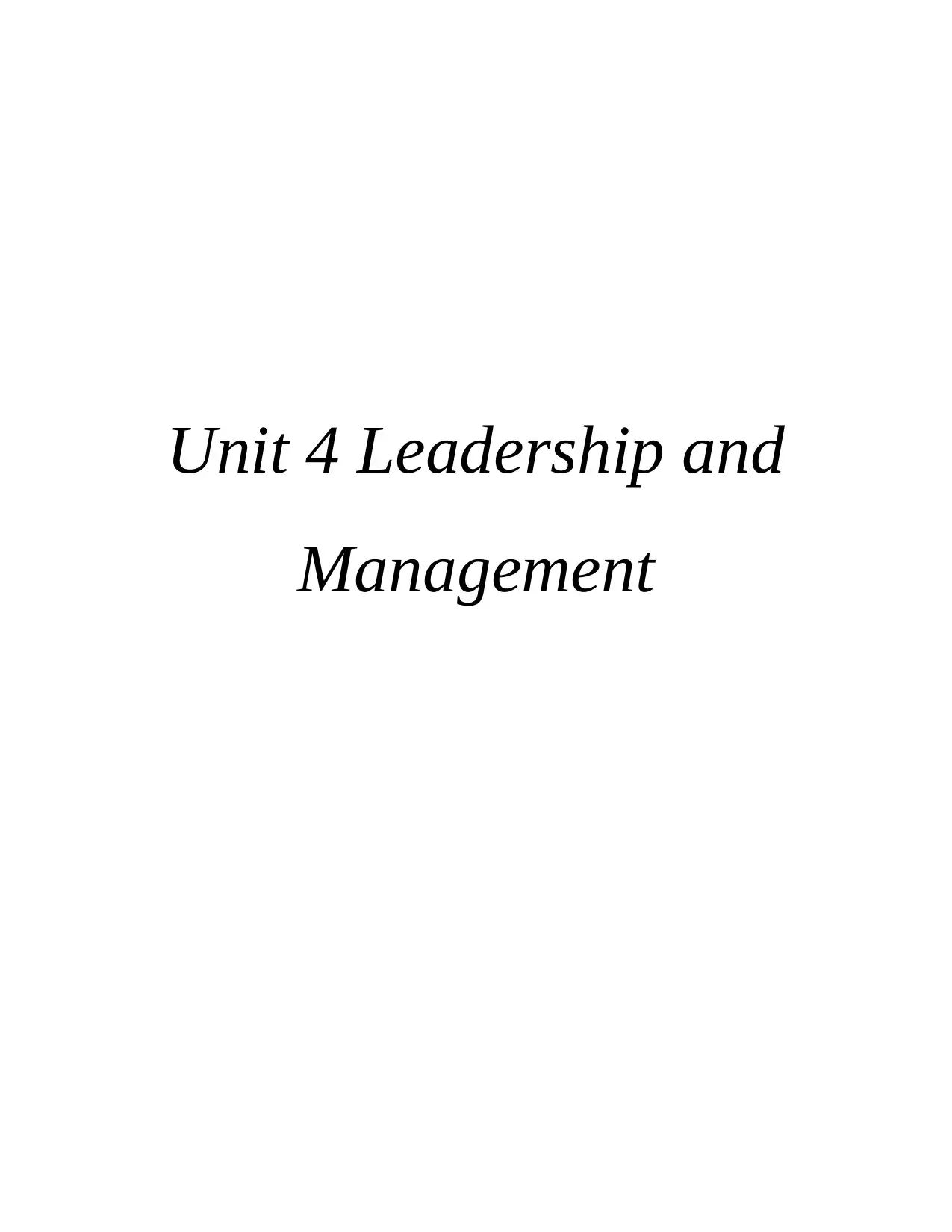
Unit 4 Leadership and
Management
Management
Secure Best Marks with AI Grader
Need help grading? Try our AI Grader for instant feedback on your assignments.
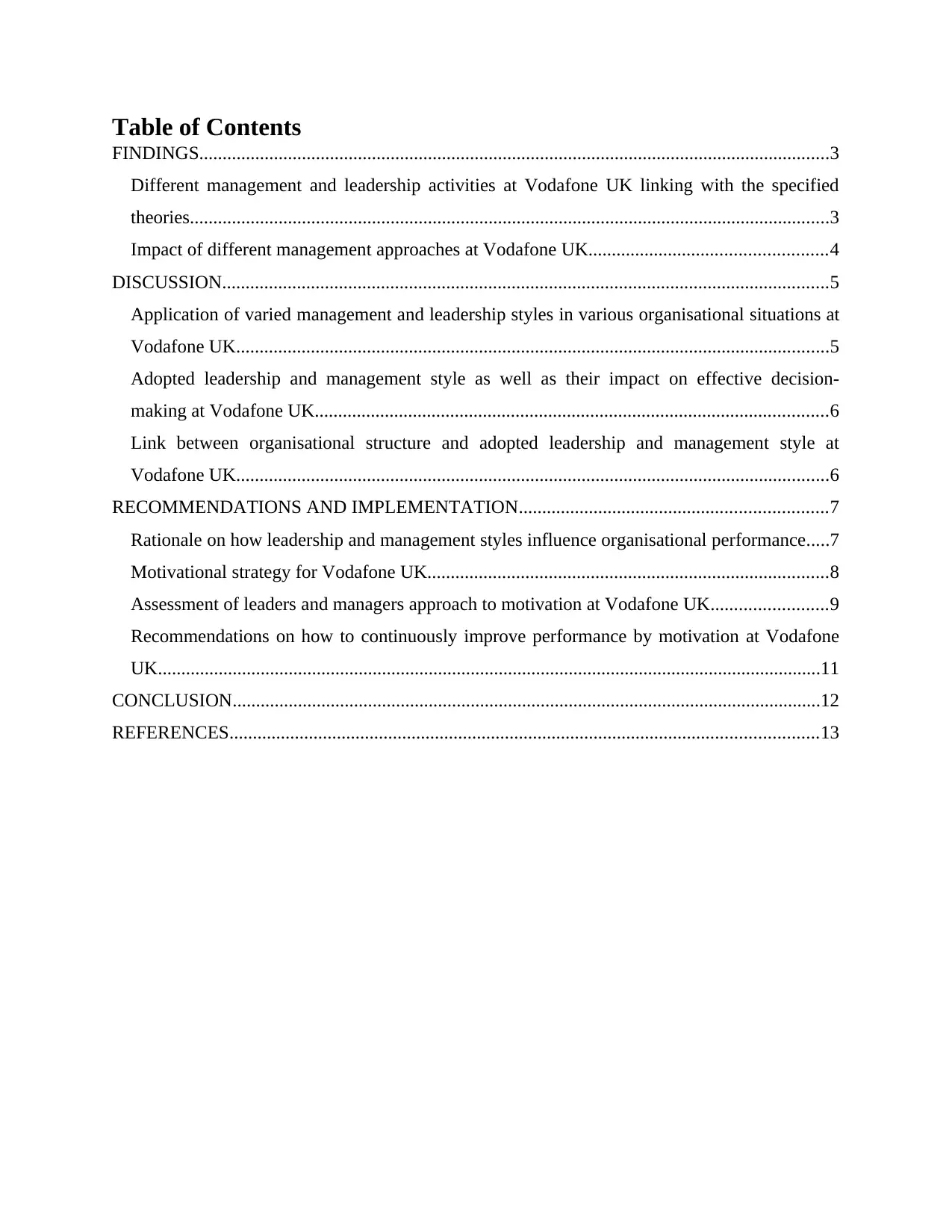
Table of Contents
FINDINGS.......................................................................................................................................3
Different management and leadership activities at Vodafone UK linking with the specified
theories.........................................................................................................................................3
Impact of different management approaches at Vodafone UK...................................................4
DISCUSSION..................................................................................................................................5
Application of varied management and leadership styles in various organisational situations at
Vodafone UK...............................................................................................................................5
Adopted leadership and management style as well as their impact on effective decision-
making at Vodafone UK..............................................................................................................6
Link between organisational structure and adopted leadership and management style at
Vodafone UK...............................................................................................................................6
RECOMMENDATIONS AND IMPLEMENTATION..................................................................7
Rationale on how leadership and management styles influence organisational performance.....7
Motivational strategy for Vodafone UK......................................................................................8
Assessment of leaders and managers approach to motivation at Vodafone UK.........................9
Recommendations on how to continuously improve performance by motivation at Vodafone
UK..............................................................................................................................................11
CONCLUSION..............................................................................................................................12
REFERENCES..............................................................................................................................13
FINDINGS.......................................................................................................................................3
Different management and leadership activities at Vodafone UK linking with the specified
theories.........................................................................................................................................3
Impact of different management approaches at Vodafone UK...................................................4
DISCUSSION..................................................................................................................................5
Application of varied management and leadership styles in various organisational situations at
Vodafone UK...............................................................................................................................5
Adopted leadership and management style as well as their impact on effective decision-
making at Vodafone UK..............................................................................................................6
Link between organisational structure and adopted leadership and management style at
Vodafone UK...............................................................................................................................6
RECOMMENDATIONS AND IMPLEMENTATION..................................................................7
Rationale on how leadership and management styles influence organisational performance.....7
Motivational strategy for Vodafone UK......................................................................................8
Assessment of leaders and managers approach to motivation at Vodafone UK.........................9
Recommendations on how to continuously improve performance by motivation at Vodafone
UK..............................................................................................................................................11
CONCLUSION..............................................................................................................................12
REFERENCES..............................................................................................................................13
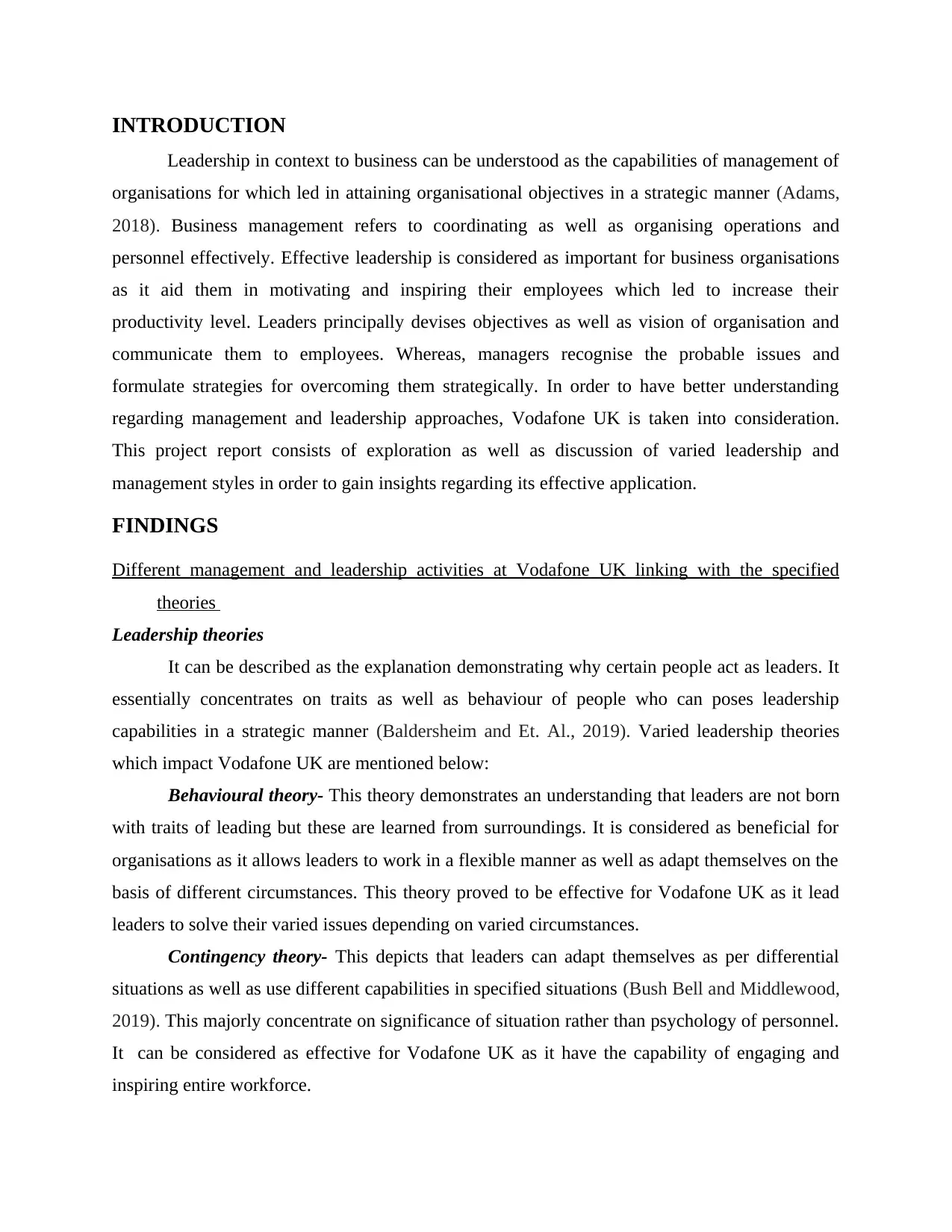
INTRODUCTION
Leadership in context to business can be understood as the capabilities of management of
organisations for which led in attaining organisational objectives in a strategic manner (Adams,
2018). Business management refers to coordinating as well as organising operations and
personnel effectively. Effective leadership is considered as important for business organisations
as it aid them in motivating and inspiring their employees which led to increase their
productivity level. Leaders principally devises objectives as well as vision of organisation and
communicate them to employees. Whereas, managers recognise the probable issues and
formulate strategies for overcoming them strategically. In order to have better understanding
regarding management and leadership approaches, Vodafone UK is taken into consideration.
This project report consists of exploration as well as discussion of varied leadership and
management styles in order to gain insights regarding its effective application.
FINDINGS
Different management and leadership activities at Vodafone UK linking with the specified
theories
Leadership theories
It can be described as the explanation demonstrating why certain people act as leaders. It
essentially concentrates on traits as well as behaviour of people who can poses leadership
capabilities in a strategic manner (Baldersheim and Et. Al., 2019). Varied leadership theories
which impact Vodafone UK are mentioned below:
Behavioural theory- This theory demonstrates an understanding that leaders are not born
with traits of leading but these are learned from surroundings. It is considered as beneficial for
organisations as it allows leaders to work in a flexible manner as well as adapt themselves on the
basis of different circumstances. This theory proved to be effective for Vodafone UK as it lead
leaders to solve their varied issues depending on varied circumstances.
Contingency theory- This depicts that leaders can adapt themselves as per differential
situations as well as use different capabilities in specified situations (Bush Bell and Middlewood,
2019). This majorly concentrate on significance of situation rather than psychology of personnel.
It can be considered as effective for Vodafone UK as it have the capability of engaging and
inspiring entire workforce.
Leadership in context to business can be understood as the capabilities of management of
organisations for which led in attaining organisational objectives in a strategic manner (Adams,
2018). Business management refers to coordinating as well as organising operations and
personnel effectively. Effective leadership is considered as important for business organisations
as it aid them in motivating and inspiring their employees which led to increase their
productivity level. Leaders principally devises objectives as well as vision of organisation and
communicate them to employees. Whereas, managers recognise the probable issues and
formulate strategies for overcoming them strategically. In order to have better understanding
regarding management and leadership approaches, Vodafone UK is taken into consideration.
This project report consists of exploration as well as discussion of varied leadership and
management styles in order to gain insights regarding its effective application.
FINDINGS
Different management and leadership activities at Vodafone UK linking with the specified
theories
Leadership theories
It can be described as the explanation demonstrating why certain people act as leaders. It
essentially concentrates on traits as well as behaviour of people who can poses leadership
capabilities in a strategic manner (Baldersheim and Et. Al., 2019). Varied leadership theories
which impact Vodafone UK are mentioned below:
Behavioural theory- This theory demonstrates an understanding that leaders are not born
with traits of leading but these are learned from surroundings. It is considered as beneficial for
organisations as it allows leaders to work in a flexible manner as well as adapt themselves on the
basis of different circumstances. This theory proved to be effective for Vodafone UK as it lead
leaders to solve their varied issues depending on varied circumstances.
Contingency theory- This depicts that leaders can adapt themselves as per differential
situations as well as use different capabilities in specified situations (Bush Bell and Middlewood,
2019). This majorly concentrate on significance of situation rather than psychology of personnel.
It can be considered as effective for Vodafone UK as it have the capability of engaging and
inspiring entire workforce.
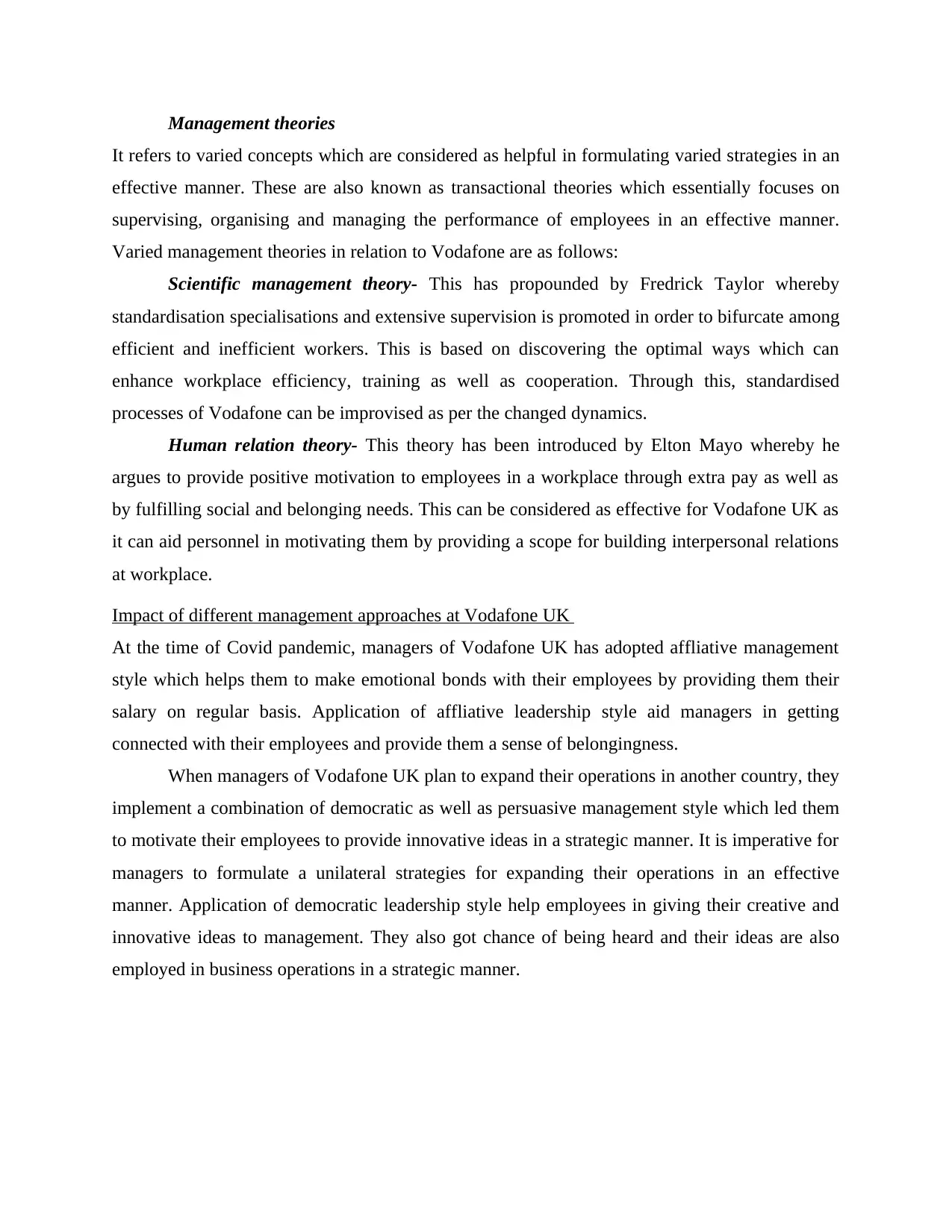
Management theories
It refers to varied concepts which are considered as helpful in formulating varied strategies in an
effective manner. These are also known as transactional theories which essentially focuses on
supervising, organising and managing the performance of employees in an effective manner.
Varied management theories in relation to Vodafone are as follows:
Scientific management theory- This has propounded by Fredrick Taylor whereby
standardisation specialisations and extensive supervision is promoted in order to bifurcate among
efficient and inefficient workers. This is based on discovering the optimal ways which can
enhance workplace efficiency, training as well as cooperation. Through this, standardised
processes of Vodafone can be improvised as per the changed dynamics.
Human relation theory- This theory has been introduced by Elton Mayo whereby he
argues to provide positive motivation to employees in a workplace through extra pay as well as
by fulfilling social and belonging needs. This can be considered as effective for Vodafone UK as
it can aid personnel in motivating them by providing a scope for building interpersonal relations
at workplace.
Impact of different management approaches at Vodafone UK
At the time of Covid pandemic, managers of Vodafone UK has adopted affliative management
style which helps them to make emotional bonds with their employees by providing them their
salary on regular basis. Application of affliative leadership style aid managers in getting
connected with their employees and provide them a sense of belongingness.
When managers of Vodafone UK plan to expand their operations in another country, they
implement a combination of democratic as well as persuasive management style which led them
to motivate their employees to provide innovative ideas in a strategic manner. It is imperative for
managers to formulate a unilateral strategies for expanding their operations in an effective
manner. Application of democratic leadership style help employees in giving their creative and
innovative ideas to management. They also got chance of being heard and their ideas are also
employed in business operations in a strategic manner.
It refers to varied concepts which are considered as helpful in formulating varied strategies in an
effective manner. These are also known as transactional theories which essentially focuses on
supervising, organising and managing the performance of employees in an effective manner.
Varied management theories in relation to Vodafone are as follows:
Scientific management theory- This has propounded by Fredrick Taylor whereby
standardisation specialisations and extensive supervision is promoted in order to bifurcate among
efficient and inefficient workers. This is based on discovering the optimal ways which can
enhance workplace efficiency, training as well as cooperation. Through this, standardised
processes of Vodafone can be improvised as per the changed dynamics.
Human relation theory- This theory has been introduced by Elton Mayo whereby he
argues to provide positive motivation to employees in a workplace through extra pay as well as
by fulfilling social and belonging needs. This can be considered as effective for Vodafone UK as
it can aid personnel in motivating them by providing a scope for building interpersonal relations
at workplace.
Impact of different management approaches at Vodafone UK
At the time of Covid pandemic, managers of Vodafone UK has adopted affliative management
style which helps them to make emotional bonds with their employees by providing them their
salary on regular basis. Application of affliative leadership style aid managers in getting
connected with their employees and provide them a sense of belongingness.
When managers of Vodafone UK plan to expand their operations in another country, they
implement a combination of democratic as well as persuasive management style which led them
to motivate their employees to provide innovative ideas in a strategic manner. It is imperative for
managers to formulate a unilateral strategies for expanding their operations in an effective
manner. Application of democratic leadership style help employees in giving their creative and
innovative ideas to management. They also got chance of being heard and their ideas are also
employed in business operations in a strategic manner.
Secure Best Marks with AI Grader
Need help grading? Try our AI Grader for instant feedback on your assignments.
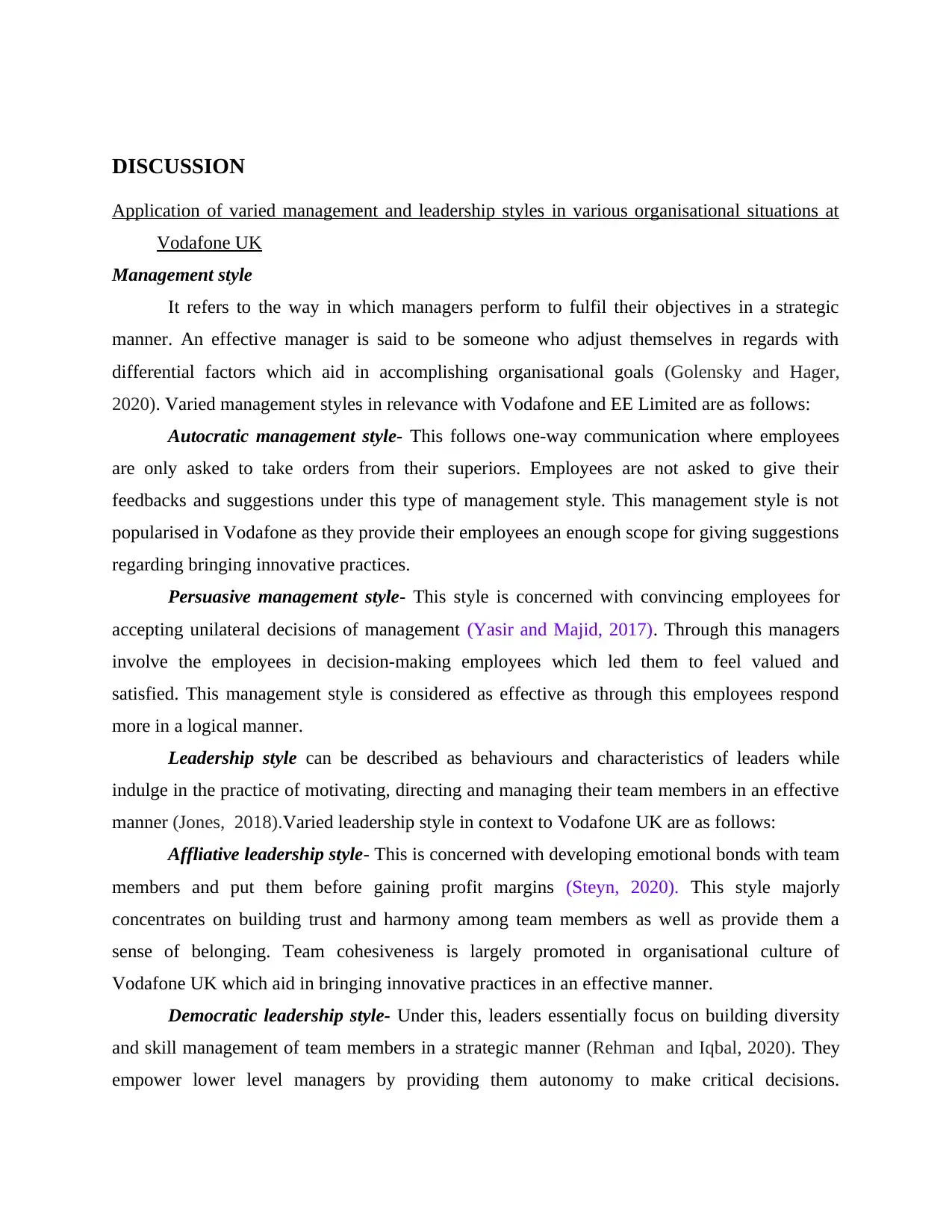
DISCUSSION
Application of varied management and leadership styles in various organisational situations at
Vodafone UK
Management style
It refers to the way in which managers perform to fulfil their objectives in a strategic
manner. An effective manager is said to be someone who adjust themselves in regards with
differential factors which aid in accomplishing organisational goals (Golensky and Hager,
2020). Varied management styles in relevance with Vodafone and EE Limited are as follows:
Autocratic management style- This follows one-way communication where employees
are only asked to take orders from their superiors. Employees are not asked to give their
feedbacks and suggestions under this type of management style. This management style is not
popularised in Vodafone as they provide their employees an enough scope for giving suggestions
regarding bringing innovative practices.
Persuasive management style- This style is concerned with convincing employees for
accepting unilateral decisions of management (Yasir and Majid, 2017). Through this managers
involve the employees in decision-making employees which led them to feel valued and
satisfied. This management style is considered as effective as through this employees respond
more in a logical manner.
Leadership style can be described as behaviours and characteristics of leaders while
indulge in the practice of motivating, directing and managing their team members in an effective
manner (Jones, 2018).Varied leadership style in context to Vodafone UK are as follows:
Affliative leadership style- This is concerned with developing emotional bonds with team
members and put them before gaining profit margins (Steyn, 2020). This style majorly
concentrates on building trust and harmony among team members as well as provide them a
sense of belonging. Team cohesiveness is largely promoted in organisational culture of
Vodafone UK which aid in bringing innovative practices in an effective manner.
Democratic leadership style- Under this, leaders essentially focus on building diversity
and skill management of team members in a strategic manner (Rehman and Iqbal, 2020). They
empower lower level managers by providing them autonomy to make critical decisions.
Application of varied management and leadership styles in various organisational situations at
Vodafone UK
Management style
It refers to the way in which managers perform to fulfil their objectives in a strategic
manner. An effective manager is said to be someone who adjust themselves in regards with
differential factors which aid in accomplishing organisational goals (Golensky and Hager,
2020). Varied management styles in relevance with Vodafone and EE Limited are as follows:
Autocratic management style- This follows one-way communication where employees
are only asked to take orders from their superiors. Employees are not asked to give their
feedbacks and suggestions under this type of management style. This management style is not
popularised in Vodafone as they provide their employees an enough scope for giving suggestions
regarding bringing innovative practices.
Persuasive management style- This style is concerned with convincing employees for
accepting unilateral decisions of management (Yasir and Majid, 2017). Through this managers
involve the employees in decision-making employees which led them to feel valued and
satisfied. This management style is considered as effective as through this employees respond
more in a logical manner.
Leadership style can be described as behaviours and characteristics of leaders while
indulge in the practice of motivating, directing and managing their team members in an effective
manner (Jones, 2018).Varied leadership style in context to Vodafone UK are as follows:
Affliative leadership style- This is concerned with developing emotional bonds with team
members and put them before gaining profit margins (Steyn, 2020). This style majorly
concentrates on building trust and harmony among team members as well as provide them a
sense of belonging. Team cohesiveness is largely promoted in organisational culture of
Vodafone UK which aid in bringing innovative practices in an effective manner.
Democratic leadership style- Under this, leaders essentially focus on building diversity
and skill management of team members in a strategic manner (Rehman and Iqbal, 2020). They
empower lower level managers by providing them autonomy to make critical decisions.
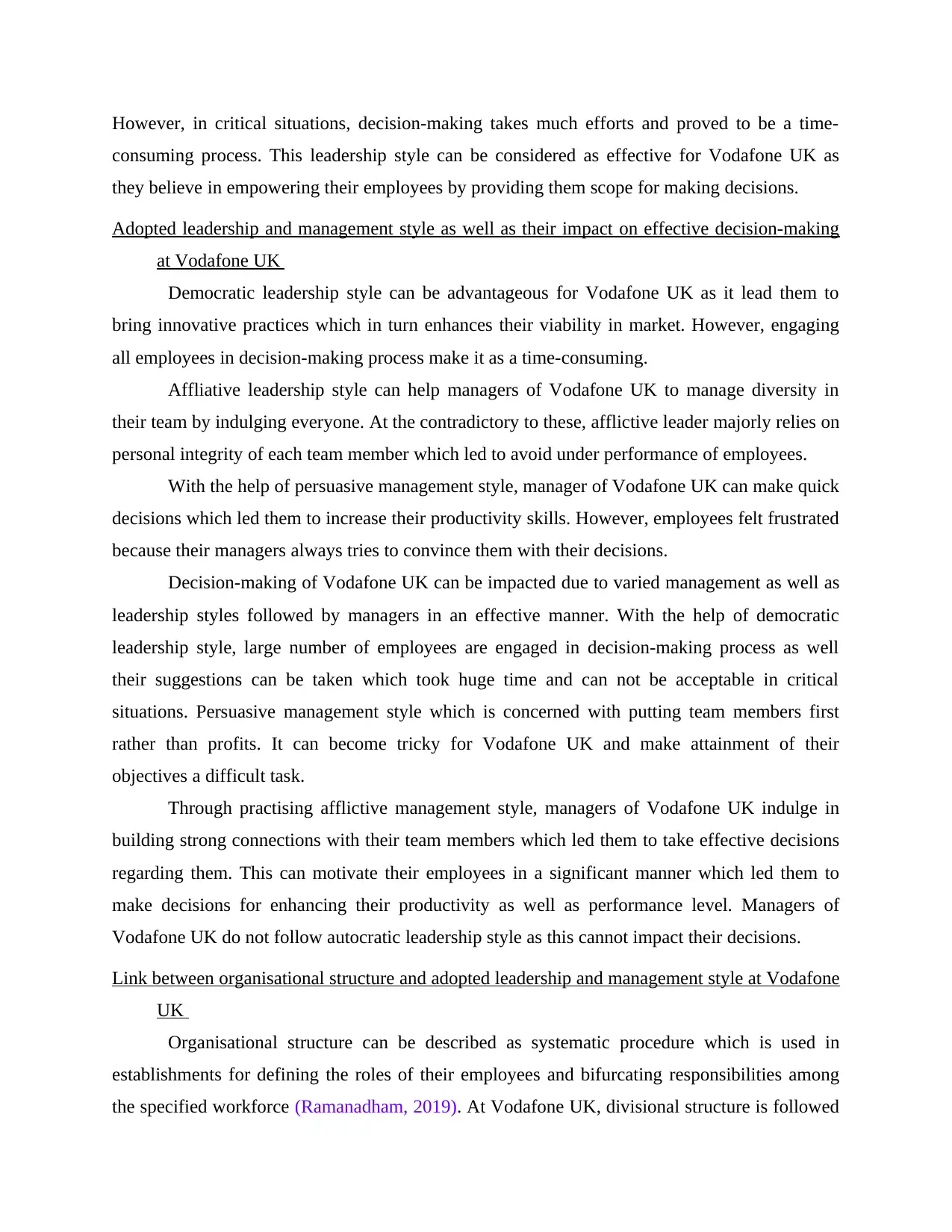
However, in critical situations, decision-making takes much efforts and proved to be a time-
consuming process. This leadership style can be considered as effective for Vodafone UK as
they believe in empowering their employees by providing them scope for making decisions.
Adopted leadership and management style as well as their impact on effective decision-making
at Vodafone UK
Democratic leadership style can be advantageous for Vodafone UK as it lead them to
bring innovative practices which in turn enhances their viability in market. However, engaging
all employees in decision-making process make it as a time-consuming.
Affliative leadership style can help managers of Vodafone UK to manage diversity in
their team by indulging everyone. At the contradictory to these, afflictive leader majorly relies on
personal integrity of each team member which led to avoid under performance of employees.
With the help of persuasive management style, manager of Vodafone UK can make quick
decisions which led them to increase their productivity skills. However, employees felt frustrated
because their managers always tries to convince them with their decisions.
Decision-making of Vodafone UK can be impacted due to varied management as well as
leadership styles followed by managers in an effective manner. With the help of democratic
leadership style, large number of employees are engaged in decision-making process as well
their suggestions can be taken which took huge time and can not be acceptable in critical
situations. Persuasive management style which is concerned with putting team members first
rather than profits. It can become tricky for Vodafone UK and make attainment of their
objectives a difficult task.
Through practising afflictive management style, managers of Vodafone UK indulge in
building strong connections with their team members which led them to take effective decisions
regarding them. This can motivate their employees in a significant manner which led them to
make decisions for enhancing their productivity as well as performance level. Managers of
Vodafone UK do not follow autocratic leadership style as this cannot impact their decisions.
Link between organisational structure and adopted leadership and management style at Vodafone
UK
Organisational structure can be described as systematic procedure which is used in
establishments for defining the roles of their employees and bifurcating responsibilities among
the specified workforce (Ramanadham, 2019). At Vodafone UK, divisional structure is followed
consuming process. This leadership style can be considered as effective for Vodafone UK as
they believe in empowering their employees by providing them scope for making decisions.
Adopted leadership and management style as well as their impact on effective decision-making
at Vodafone UK
Democratic leadership style can be advantageous for Vodafone UK as it lead them to
bring innovative practices which in turn enhances their viability in market. However, engaging
all employees in decision-making process make it as a time-consuming.
Affliative leadership style can help managers of Vodafone UK to manage diversity in
their team by indulging everyone. At the contradictory to these, afflictive leader majorly relies on
personal integrity of each team member which led to avoid under performance of employees.
With the help of persuasive management style, manager of Vodafone UK can make quick
decisions which led them to increase their productivity skills. However, employees felt frustrated
because their managers always tries to convince them with their decisions.
Decision-making of Vodafone UK can be impacted due to varied management as well as
leadership styles followed by managers in an effective manner. With the help of democratic
leadership style, large number of employees are engaged in decision-making process as well
their suggestions can be taken which took huge time and can not be acceptable in critical
situations. Persuasive management style which is concerned with putting team members first
rather than profits. It can become tricky for Vodafone UK and make attainment of their
objectives a difficult task.
Through practising afflictive management style, managers of Vodafone UK indulge in
building strong connections with their team members which led them to take effective decisions
regarding them. This can motivate their employees in a significant manner which led them to
make decisions for enhancing their productivity as well as performance level. Managers of
Vodafone UK do not follow autocratic leadership style as this cannot impact their decisions.
Link between organisational structure and adopted leadership and management style at Vodafone
UK
Organisational structure can be described as systematic procedure which is used in
establishments for defining the roles of their employees and bifurcating responsibilities among
the specified workforce (Ramanadham, 2019). At Vodafone UK, divisional structure is followed
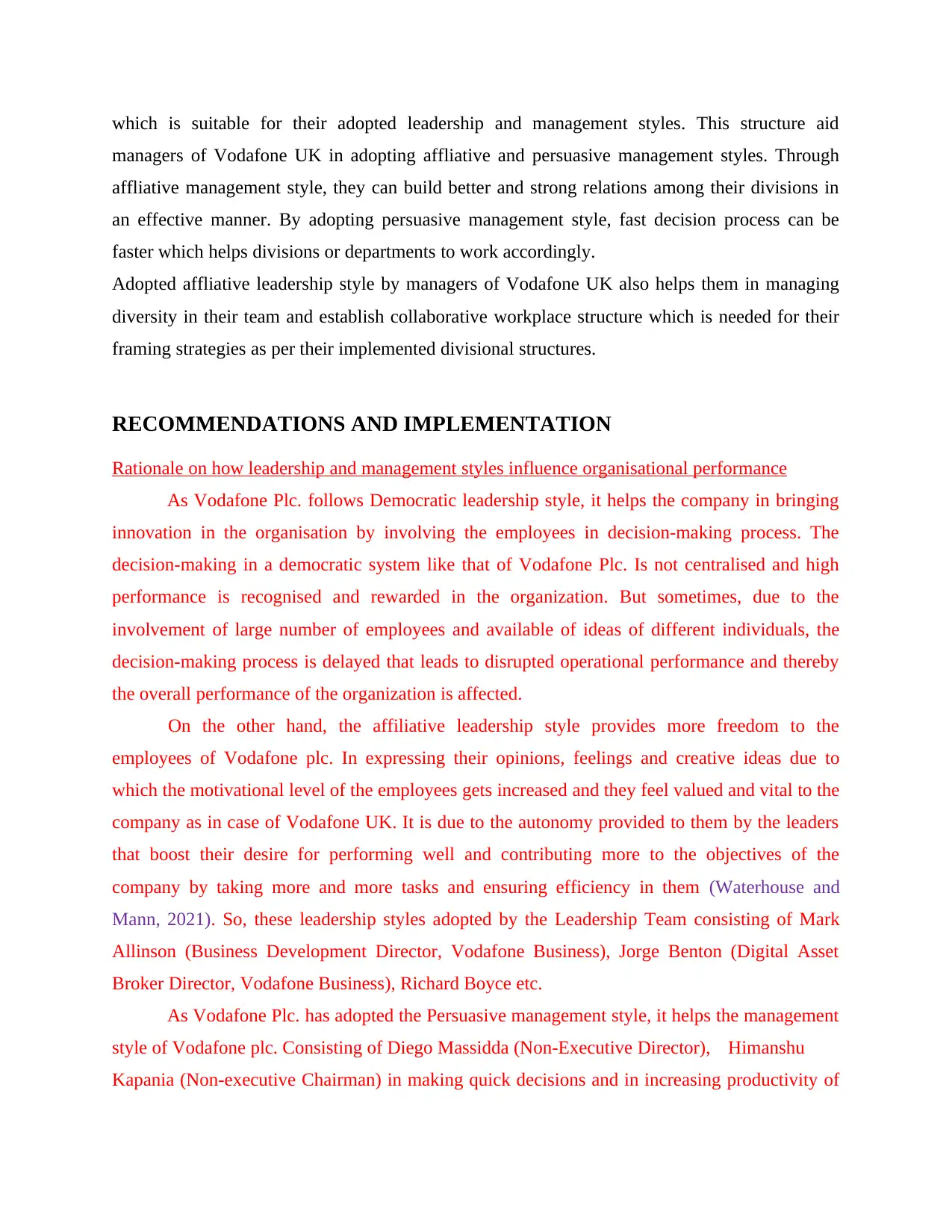
which is suitable for their adopted leadership and management styles. This structure aid
managers of Vodafone UK in adopting affliative and persuasive management styles. Through
affliative management style, they can build better and strong relations among their divisions in
an effective manner. By adopting persuasive management style, fast decision process can be
faster which helps divisions or departments to work accordingly.
Adopted affliative leadership style by managers of Vodafone UK also helps them in managing
diversity in their team and establish collaborative workplace structure which is needed for their
framing strategies as per their implemented divisional structures.
RECOMMENDATIONS AND IMPLEMENTATION
Rationale on how leadership and management styles influence organisational performance
As Vodafone Plc. follows Democratic leadership style, it helps the company in bringing
innovation in the organisation by involving the employees in decision-making process. The
decision-making in a democratic system like that of Vodafone Plc. Is not centralised and high
performance is recognised and rewarded in the organization. But sometimes, due to the
involvement of large number of employees and available of ideas of different individuals, the
decision-making process is delayed that leads to disrupted operational performance and thereby
the overall performance of the organization is affected.
On the other hand, the affiliative leadership style provides more freedom to the
employees of Vodafone plc. In expressing their opinions, feelings and creative ideas due to
which the motivational level of the employees gets increased and they feel valued and vital to the
company as in case of Vodafone UK. It is due to the autonomy provided to them by the leaders
that boost their desire for performing well and contributing more to the objectives of the
company by taking more and more tasks and ensuring efficiency in them (Waterhouse and
Mann, 2021). So, these leadership styles adopted by the Leadership Team consisting of Mark
Allinson (Business Development Director, Vodafone Business), Jorge Benton (Digital Asset
Broker Director, Vodafone Business), Richard Boyce etc.
As Vodafone Plc. has adopted the Persuasive management style, it helps the management
style of Vodafone plc. Consisting of Diego Massidda (Non-Executive Director), Himanshu
Kapania (Non-executive Chairman) in making quick decisions and in increasing productivity of
managers of Vodafone UK in adopting affliative and persuasive management styles. Through
affliative management style, they can build better and strong relations among their divisions in
an effective manner. By adopting persuasive management style, fast decision process can be
faster which helps divisions or departments to work accordingly.
Adopted affliative leadership style by managers of Vodafone UK also helps them in managing
diversity in their team and establish collaborative workplace structure which is needed for their
framing strategies as per their implemented divisional structures.
RECOMMENDATIONS AND IMPLEMENTATION
Rationale on how leadership and management styles influence organisational performance
As Vodafone Plc. follows Democratic leadership style, it helps the company in bringing
innovation in the organisation by involving the employees in decision-making process. The
decision-making in a democratic system like that of Vodafone Plc. Is not centralised and high
performance is recognised and rewarded in the organization. But sometimes, due to the
involvement of large number of employees and available of ideas of different individuals, the
decision-making process is delayed that leads to disrupted operational performance and thereby
the overall performance of the organization is affected.
On the other hand, the affiliative leadership style provides more freedom to the
employees of Vodafone plc. In expressing their opinions, feelings and creative ideas due to
which the motivational level of the employees gets increased and they feel valued and vital to the
company as in case of Vodafone UK. It is due to the autonomy provided to them by the leaders
that boost their desire for performing well and contributing more to the objectives of the
company by taking more and more tasks and ensuring efficiency in them (Waterhouse and
Mann, 2021). So, these leadership styles adopted by the Leadership Team consisting of Mark
Allinson (Business Development Director, Vodafone Business), Jorge Benton (Digital Asset
Broker Director, Vodafone Business), Richard Boyce etc.
As Vodafone Plc. has adopted the Persuasive management style, it helps the management
style of Vodafone plc. Consisting of Diego Massidda (Non-Executive Director), Himanshu
Kapania (Non-executive Chairman) in making quick decisions and in increasing productivity of
Paraphrase This Document
Need a fresh take? Get an instant paraphrase of this document with our AI Paraphraser
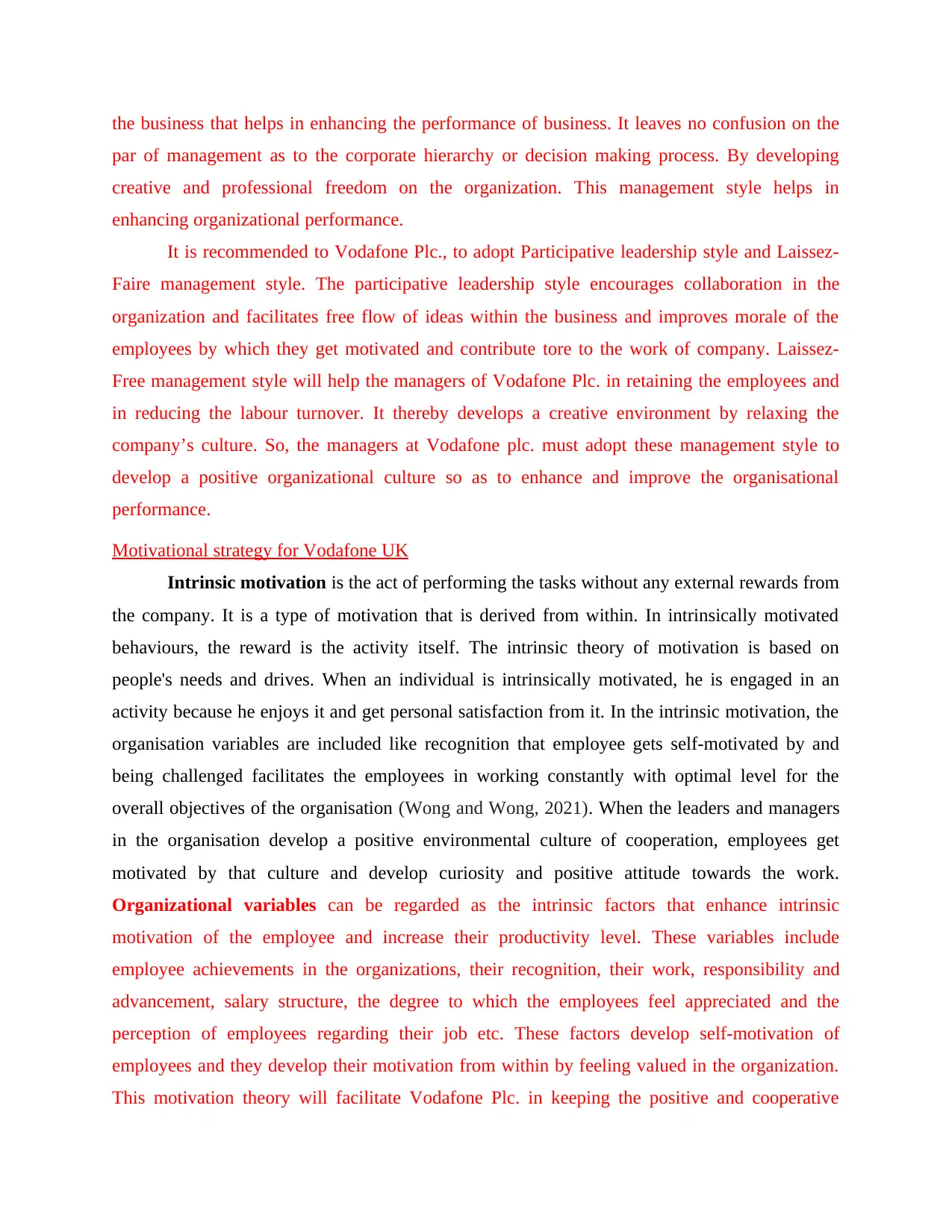
the business that helps in enhancing the performance of business. It leaves no confusion on the
par of management as to the corporate hierarchy or decision making process. By developing
creative and professional freedom on the organization. This management style helps in
enhancing organizational performance.
It is recommended to Vodafone Plc., to adopt Participative leadership style and Laissez-
Faire management style. The participative leadership style encourages collaboration in the
organization and facilitates free flow of ideas within the business and improves morale of the
employees by which they get motivated and contribute tore to the work of company. Laissez-
Free management style will help the managers of Vodafone Plc. in retaining the employees and
in reducing the labour turnover. It thereby develops a creative environment by relaxing the
company’s culture. So, the managers at Vodafone plc. must adopt these management style to
develop a positive organizational culture so as to enhance and improve the organisational
performance.
Motivational strategy for Vodafone UK
Intrinsic motivation is the act of performing the tasks without any external rewards from
the company. It is a type of motivation that is derived from within. In intrinsically motivated
behaviours, the reward is the activity itself. The intrinsic theory of motivation is based on
people's needs and drives. When an individual is intrinsically motivated, he is engaged in an
activity because he enjoys it and get personal satisfaction from it. In the intrinsic motivation, the
organisation variables are included like recognition that employee gets self-motivated by and
being challenged facilitates the employees in working constantly with optimal level for the
overall objectives of the organisation (Wong and Wong, 2021). When the leaders and managers
in the organisation develop a positive environmental culture of cooperation, employees get
motivated by that culture and develop curiosity and positive attitude towards the work.
Organizational variables can be regarded as the intrinsic factors that enhance intrinsic
motivation of the employee and increase their productivity level. These variables include
employee achievements in the organizations, their recognition, their work, responsibility and
advancement, salary structure, the degree to which the employees feel appreciated and the
perception of employees regarding their job etc. These factors develop self-motivation of
employees and they develop their motivation from within by feeling valued in the organization.
This motivation theory will facilitate Vodafone Plc. in keeping the positive and cooperative
par of management as to the corporate hierarchy or decision making process. By developing
creative and professional freedom on the organization. This management style helps in
enhancing organizational performance.
It is recommended to Vodafone Plc., to adopt Participative leadership style and Laissez-
Faire management style. The participative leadership style encourages collaboration in the
organization and facilitates free flow of ideas within the business and improves morale of the
employees by which they get motivated and contribute tore to the work of company. Laissez-
Free management style will help the managers of Vodafone Plc. in retaining the employees and
in reducing the labour turnover. It thereby develops a creative environment by relaxing the
company’s culture. So, the managers at Vodafone plc. must adopt these management style to
develop a positive organizational culture so as to enhance and improve the organisational
performance.
Motivational strategy for Vodafone UK
Intrinsic motivation is the act of performing the tasks without any external rewards from
the company. It is a type of motivation that is derived from within. In intrinsically motivated
behaviours, the reward is the activity itself. The intrinsic theory of motivation is based on
people's needs and drives. When an individual is intrinsically motivated, he is engaged in an
activity because he enjoys it and get personal satisfaction from it. In the intrinsic motivation, the
organisation variables are included like recognition that employee gets self-motivated by and
being challenged facilitates the employees in working constantly with optimal level for the
overall objectives of the organisation (Wong and Wong, 2021). When the leaders and managers
in the organisation develop a positive environmental culture of cooperation, employees get
motivated by that culture and develop curiosity and positive attitude towards the work.
Organizational variables can be regarded as the intrinsic factors that enhance intrinsic
motivation of the employee and increase their productivity level. These variables include
employee achievements in the organizations, their recognition, their work, responsibility and
advancement, salary structure, the degree to which the employees feel appreciated and the
perception of employees regarding their job etc. These factors develop self-motivation of
employees and they develop their motivation from within by feeling valued in the organization.
This motivation theory will facilitate Vodafone Plc. in keeping the positive and cooperative
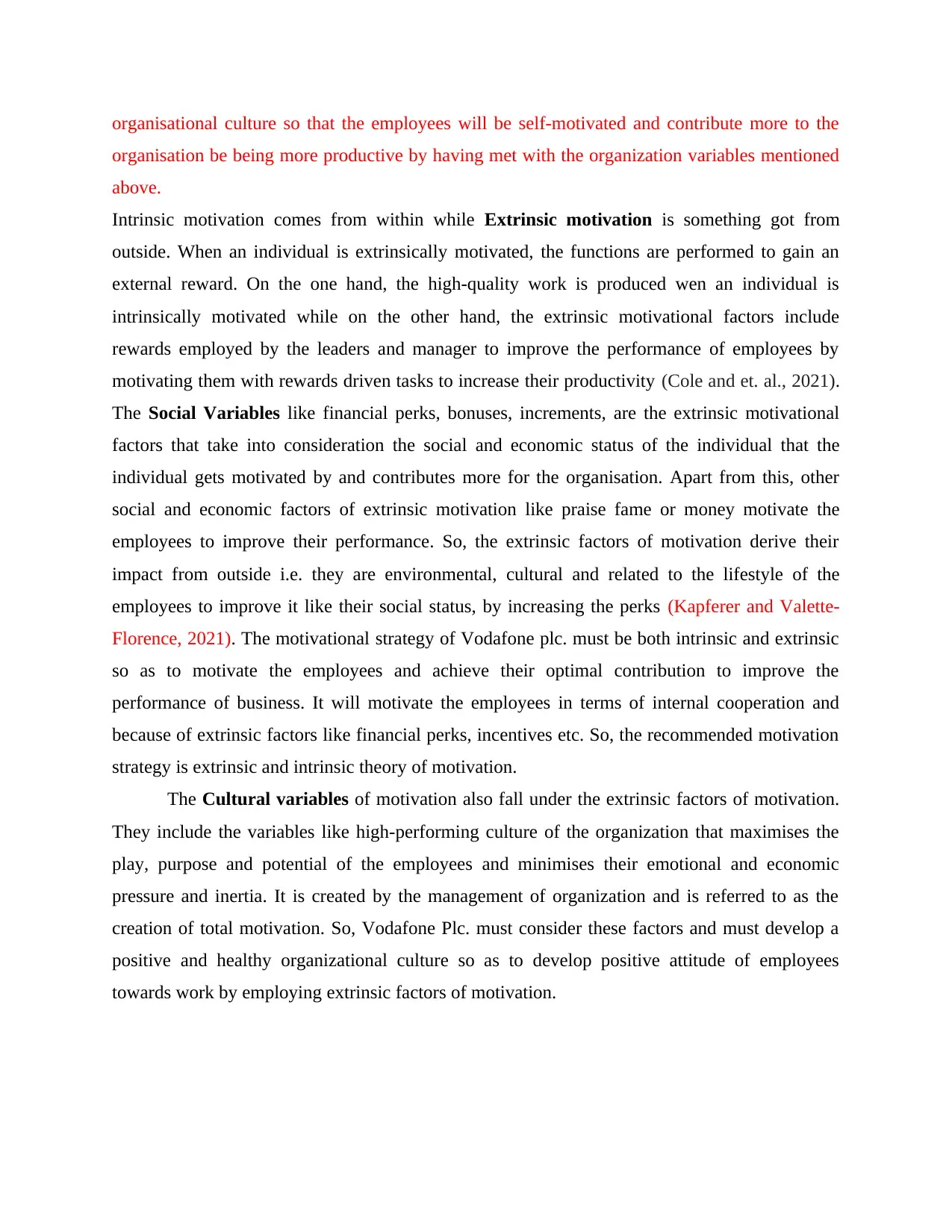
organisational culture so that the employees will be self-motivated and contribute more to the
organisation be being more productive by having met with the organization variables mentioned
above.
Intrinsic motivation comes from within while Extrinsic motivation is something got from
outside. When an individual is extrinsically motivated, the functions are performed to gain an
external reward. On the one hand, the high-quality work is produced wen an individual is
intrinsically motivated while on the other hand, the extrinsic motivational factors include
rewards employed by the leaders and manager to improve the performance of employees by
motivating them with rewards driven tasks to increase their productivity (Cole and et. al., 2021).
The Social Variables like financial perks, bonuses, increments, are the extrinsic motivational
factors that take into consideration the social and economic status of the individual that the
individual gets motivated by and contributes more for the organisation. Apart from this, other
social and economic factors of extrinsic motivation like praise fame or money motivate the
employees to improve their performance. So, the extrinsic factors of motivation derive their
impact from outside i.e. they are environmental, cultural and related to the lifestyle of the
employees to improve it like their social status, by increasing the perks (Kapferer and Valette-
Florence, 2021). The motivational strategy of Vodafone plc. must be both intrinsic and extrinsic
so as to motivate the employees and achieve their optimal contribution to improve the
performance of business. It will motivate the employees in terms of internal cooperation and
because of extrinsic factors like financial perks, incentives etc. So, the recommended motivation
strategy is extrinsic and intrinsic theory of motivation.
The Cultural variables of motivation also fall under the extrinsic factors of motivation.
They include the variables like high-performing culture of the organization that maximises the
play, purpose and potential of the employees and minimises their emotional and economic
pressure and inertia. It is created by the management of organization and is referred to as the
creation of total motivation. So, Vodafone Plc. must consider these factors and must develop a
positive and healthy organizational culture so as to develop positive attitude of employees
towards work by employing extrinsic factors of motivation.
organisation be being more productive by having met with the organization variables mentioned
above.
Intrinsic motivation comes from within while Extrinsic motivation is something got from
outside. When an individual is extrinsically motivated, the functions are performed to gain an
external reward. On the one hand, the high-quality work is produced wen an individual is
intrinsically motivated while on the other hand, the extrinsic motivational factors include
rewards employed by the leaders and manager to improve the performance of employees by
motivating them with rewards driven tasks to increase their productivity (Cole and et. al., 2021).
The Social Variables like financial perks, bonuses, increments, are the extrinsic motivational
factors that take into consideration the social and economic status of the individual that the
individual gets motivated by and contributes more for the organisation. Apart from this, other
social and economic factors of extrinsic motivation like praise fame or money motivate the
employees to improve their performance. So, the extrinsic factors of motivation derive their
impact from outside i.e. they are environmental, cultural and related to the lifestyle of the
employees to improve it like their social status, by increasing the perks (Kapferer and Valette-
Florence, 2021). The motivational strategy of Vodafone plc. must be both intrinsic and extrinsic
so as to motivate the employees and achieve their optimal contribution to improve the
performance of business. It will motivate the employees in terms of internal cooperation and
because of extrinsic factors like financial perks, incentives etc. So, the recommended motivation
strategy is extrinsic and intrinsic theory of motivation.
The Cultural variables of motivation also fall under the extrinsic factors of motivation.
They include the variables like high-performing culture of the organization that maximises the
play, purpose and potential of the employees and minimises their emotional and economic
pressure and inertia. It is created by the management of organization and is referred to as the
creation of total motivation. So, Vodafone Plc. must consider these factors and must develop a
positive and healthy organizational culture so as to develop positive attitude of employees
towards work by employing extrinsic factors of motivation.
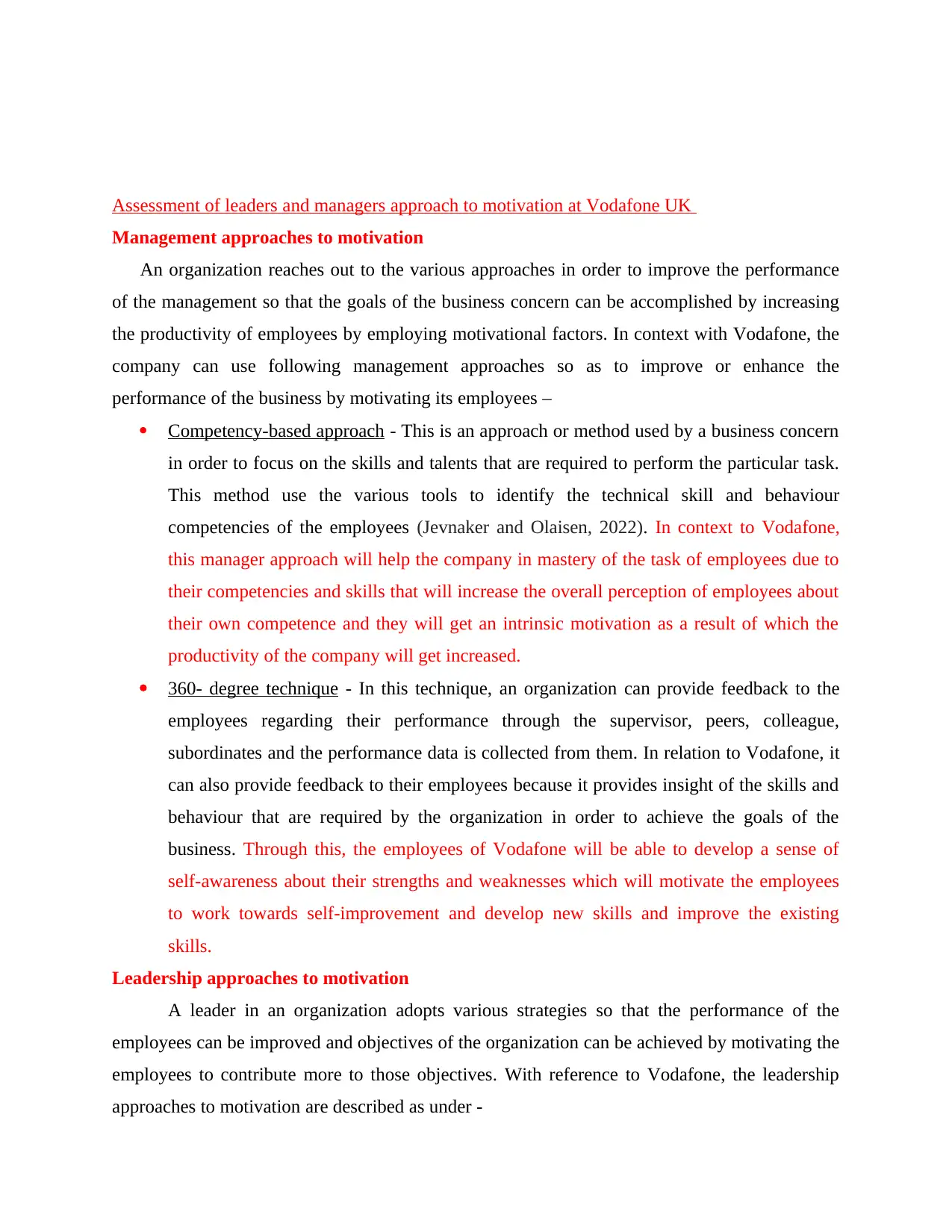
Assessment of leaders and managers approach to motivation at Vodafone UK
Management approaches to motivation
An organization reaches out to the various approaches in order to improve the performance
of the management so that the goals of the business concern can be accomplished by increasing
the productivity of employees by employing motivational factors. In context with Vodafone, the
company can use following management approaches so as to improve or enhance the
performance of the business by motivating its employees –
Competency-based approach - This is an approach or method used by a business concern
in order to focus on the skills and talents that are required to perform the particular task.
This method use the various tools to identify the technical skill and behaviour
competencies of the employees (Jevnaker and Olaisen, 2022). In context to Vodafone,
this manager approach will help the company in mastery of the task of employees due to
their competencies and skills that will increase the overall perception of employees about
their own competence and they will get an intrinsic motivation as a result of which the
productivity of the company will get increased.
360- degree technique - In this technique, an organization can provide feedback to the
employees regarding their performance through the supervisor, peers, colleague,
subordinates and the performance data is collected from them. In relation to Vodafone, it
can also provide feedback to their employees because it provides insight of the skills and
behaviour that are required by the organization in order to achieve the goals of the
business. Through this, the employees of Vodafone will be able to develop a sense of
self-awareness about their strengths and weaknesses which will motivate the employees
to work towards self-improvement and develop new skills and improve the existing
skills.
Leadership approaches to motivation
A leader in an organization adopts various strategies so that the performance of the
employees can be improved and objectives of the organization can be achieved by motivating the
employees to contribute more to those objectives. With reference to Vodafone, the leadership
approaches to motivation are described as under -
Management approaches to motivation
An organization reaches out to the various approaches in order to improve the performance
of the management so that the goals of the business concern can be accomplished by increasing
the productivity of employees by employing motivational factors. In context with Vodafone, the
company can use following management approaches so as to improve or enhance the
performance of the business by motivating its employees –
Competency-based approach - This is an approach or method used by a business concern
in order to focus on the skills and talents that are required to perform the particular task.
This method use the various tools to identify the technical skill and behaviour
competencies of the employees (Jevnaker and Olaisen, 2022). In context to Vodafone,
this manager approach will help the company in mastery of the task of employees due to
their competencies and skills that will increase the overall perception of employees about
their own competence and they will get an intrinsic motivation as a result of which the
productivity of the company will get increased.
360- degree technique - In this technique, an organization can provide feedback to the
employees regarding their performance through the supervisor, peers, colleague,
subordinates and the performance data is collected from them. In relation to Vodafone, it
can also provide feedback to their employees because it provides insight of the skills and
behaviour that are required by the organization in order to achieve the goals of the
business. Through this, the employees of Vodafone will be able to develop a sense of
self-awareness about their strengths and weaknesses which will motivate the employees
to work towards self-improvement and develop new skills and improve the existing
skills.
Leadership approaches to motivation
A leader in an organization adopts various strategies so that the performance of the
employees can be improved and objectives of the organization can be achieved by motivating the
employees to contribute more to those objectives. With reference to Vodafone, the leadership
approaches to motivation are described as under -
Secure Best Marks with AI Grader
Need help grading? Try our AI Grader for instant feedback on your assignments.
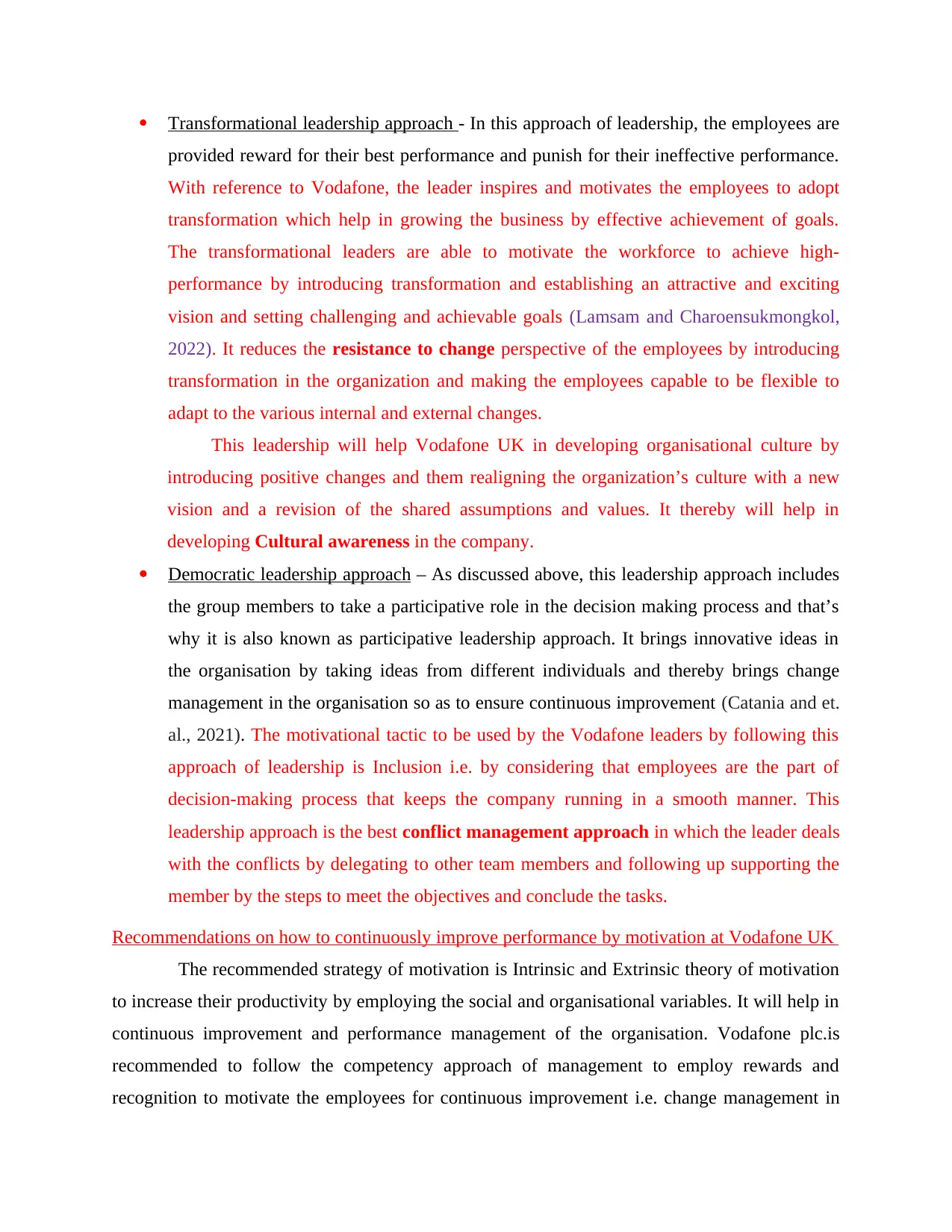
Transformational leadership approach - In this approach of leadership, the employees are
provided reward for their best performance and punish for their ineffective performance.
With reference to Vodafone, the leader inspires and motivates the employees to adopt
transformation which help in growing the business by effective achievement of goals.
The transformational leaders are able to motivate the workforce to achieve high-
performance by introducing transformation and establishing an attractive and exciting
vision and setting challenging and achievable goals (Lamsam and Charoensukmongkol,
2022). It reduces the resistance to change perspective of the employees by introducing
transformation in the organization and making the employees capable to be flexible to
adapt to the various internal and external changes.
This leadership will help Vodafone UK in developing organisational culture by
introducing positive changes and them realigning the organization’s culture with a new
vision and a revision of the shared assumptions and values. It thereby will help in
developing Cultural awareness in the company.
Democratic leadership approach – As discussed above, this leadership approach includes
the group members to take a participative role in the decision making process and that’s
why it is also known as participative leadership approach. It brings innovative ideas in
the organisation by taking ideas from different individuals and thereby brings change
management in the organisation so as to ensure continuous improvement (Catania and et.
al., 2021). The motivational tactic to be used by the Vodafone leaders by following this
approach of leadership is Inclusion i.e. by considering that employees are the part of
decision-making process that keeps the company running in a smooth manner. This
leadership approach is the best conflict management approach in which the leader deals
with the conflicts by delegating to other team members and following up supporting the
member by the steps to meet the objectives and conclude the tasks.
Recommendations on how to continuously improve performance by motivation at Vodafone UK
The recommended strategy of motivation is Intrinsic and Extrinsic theory of motivation
to increase their productivity by employing the social and organisational variables. It will help in
continuous improvement and performance management of the organisation. Vodafone plc.is
recommended to follow the competency approach of management to employ rewards and
recognition to motivate the employees for continuous improvement i.e. change management in
provided reward for their best performance and punish for their ineffective performance.
With reference to Vodafone, the leader inspires and motivates the employees to adopt
transformation which help in growing the business by effective achievement of goals.
The transformational leaders are able to motivate the workforce to achieve high-
performance by introducing transformation and establishing an attractive and exciting
vision and setting challenging and achievable goals (Lamsam and Charoensukmongkol,
2022). It reduces the resistance to change perspective of the employees by introducing
transformation in the organization and making the employees capable to be flexible to
adapt to the various internal and external changes.
This leadership will help Vodafone UK in developing organisational culture by
introducing positive changes and them realigning the organization’s culture with a new
vision and a revision of the shared assumptions and values. It thereby will help in
developing Cultural awareness in the company.
Democratic leadership approach – As discussed above, this leadership approach includes
the group members to take a participative role in the decision making process and that’s
why it is also known as participative leadership approach. It brings innovative ideas in
the organisation by taking ideas from different individuals and thereby brings change
management in the organisation so as to ensure continuous improvement (Catania and et.
al., 2021). The motivational tactic to be used by the Vodafone leaders by following this
approach of leadership is Inclusion i.e. by considering that employees are the part of
decision-making process that keeps the company running in a smooth manner. This
leadership approach is the best conflict management approach in which the leader deals
with the conflicts by delegating to other team members and following up supporting the
member by the steps to meet the objectives and conclude the tasks.
Recommendations on how to continuously improve performance by motivation at Vodafone UK
The recommended strategy of motivation is Intrinsic and Extrinsic theory of motivation
to increase their productivity by employing the social and organisational variables. It will help in
continuous improvement and performance management of the organisation. Vodafone plc.is
recommended to follow the competency approach of management to employ rewards and
recognition to motivate the employees for continuous improvement i.e. change management in

the organisation by putting more focus on their talent. The recommended leadership style is
transformational leadership that is best suitable for change management i.e. continuous
improvement in the organisation.
CONCLUSION
From the above discussion, it has been concluded that leadership and management, both
play an essential role in contributing to the objectives of the organisation. The report has been
discussed in context with management and leadership styles of a telecommunications company
of UK. It has been identified that democratic style of leadership leaves autonomy on the part of
employees and includes them in decision making process and thereby bring innovative ideas in
the organisation. Further the report has also examined the importance of organisational and
factors that contribute in the development of effective and positive organisational structure. The
report has also provided the comprehensive motivational strategy and the recommended strategy
is Extrinsic as well as Intrinsic theory of motivation. It has also highlighted the leadership and
management approaches for performance enhancement and continuous improvement by
considering motivational factors in the organization. The recommendation regarding the
motivation strategy and leadership & management approaches’ contribution to the continuous
improvement has also been dealt with.
transformational leadership that is best suitable for change management i.e. continuous
improvement in the organisation.
CONCLUSION
From the above discussion, it has been concluded that leadership and management, both
play an essential role in contributing to the objectives of the organisation. The report has been
discussed in context with management and leadership styles of a telecommunications company
of UK. It has been identified that democratic style of leadership leaves autonomy on the part of
employees and includes them in decision making process and thereby bring innovative ideas in
the organisation. Further the report has also examined the importance of organisational and
factors that contribute in the development of effective and positive organisational structure. The
report has also provided the comprehensive motivational strategy and the recommended strategy
is Extrinsic as well as Intrinsic theory of motivation. It has also highlighted the leadership and
management approaches for performance enhancement and continuous improvement by
considering motivational factors in the organization. The recommendation regarding the
motivation strategy and leadership & management approaches’ contribution to the continuous
improvement has also been dealt with.

REFERENCES
Books and Journals:
Adams, D., 2018. Mastering theories of educational leadership and management. University of
Malaya Press.
Baldersheim, H. and Et. Al., 2019. Functions of the Executive: Power, Leadership, and
Management. In Local Democracy and the Processes of Transformation in East-Central
Europe (pp. 197-224). Routledge.
Bush, T., Bell, L. and Middlewood, D. eds., 2019. Principles of educational leadership &
management. Sage.
Catania, G., and et. al., 2021. Lessons from Italian front‐line nurses' experiences during the
COVID‐19 pandemic: A qualitative descriptive study. Journal of nursing
management, 29(3), pp.404-411.
Cole, J., and et. al., 2021. Implementation of a motivational interviewing-based decision tool to
improve childhood vaccination rates: Pilot study protocol. Research in Social and
Administrative Pharmacy, 17(3), pp.619-624.
Ghaderi, Z., King, B. and Hall, C.M., 2021. Crisis preparedness of hospitality managers:
evidence from Malaysia. Journal of Hospitality and Tourism Insights.
Golensky, M. and Hager, M., 2020. Strategic leadership and management in nonprofit
organizations: Theory and practice. Oxford University Press.
Howlett, M.A., and et. al., 2021. Investigating the effects of academic coaching on college
students’ metacognition. Innovative Higher Education, 46(2), pp.189-204.
Iszatt-White, M. and Saunders, C., 2017. Leadership. Oxford University Press.
Jevnaker, B.H. and Olaisen, J., 2022. Travelling leadership ideas as a business virus
infection. Towards a science of ideas: An inquiry into the emergence, evolution and
expansion of ideas and their translation into action, p.199.
Jones, G., 2018. Evidence-based school leadership and management: A practical guide. Sage.
Kapferer, J.N. and Valette-Florence, P., 2021. Which consumers believe luxury must be
expensive and why? A cross-cultural comparison of motivations. Journal of Business
Research, 132, pp.301-313.
Lamsam, N. and Charoensukmongkol, P., 2022. Effect of CEO transformational leadership on
organizational ethical culture and firm performance: the moderating effect of
competitive intensity. Journal of Asia Business Studies, (ahead-of-print).
Owusu-Addo, E., and et. al., 2021. Effective implementation approaches for healthy ageing
interventions for older people: a rapid review. Archives of Gerontology and
Geriatrics, 92, p.104263.
Ramanadham, V.V. ed., 2019. Public enterprise: studies in organisational structure. Routledge.
Rehman, U. U. and Iqbal, A., 2020. Nexus of knowledge-oriented leadership, knowledge
management, innovation and organizational performance in higher education. Business
Process Management Journal.
Steyn, R., 2020. Leadership Styles and Organisational Structure. International Journal of
Human Resource Studies. 10(3). pp.98116-98116.
Waterhouse, J. and Mann, S., 2021. Mapping Domain Knowledge for Leading and Managing
Change. The Serials Librarian, 80(1-4), pp.3-10.
Wong, I.H. and Wong, T.T., 2021. Exploring the relationship between intellectual humility and
academic performance among post-secondary students: The mediating roles of learning
Books and Journals:
Adams, D., 2018. Mastering theories of educational leadership and management. University of
Malaya Press.
Baldersheim, H. and Et. Al., 2019. Functions of the Executive: Power, Leadership, and
Management. In Local Democracy and the Processes of Transformation in East-Central
Europe (pp. 197-224). Routledge.
Bush, T., Bell, L. and Middlewood, D. eds., 2019. Principles of educational leadership &
management. Sage.
Catania, G., and et. al., 2021. Lessons from Italian front‐line nurses' experiences during the
COVID‐19 pandemic: A qualitative descriptive study. Journal of nursing
management, 29(3), pp.404-411.
Cole, J., and et. al., 2021. Implementation of a motivational interviewing-based decision tool to
improve childhood vaccination rates: Pilot study protocol. Research in Social and
Administrative Pharmacy, 17(3), pp.619-624.
Ghaderi, Z., King, B. and Hall, C.M., 2021. Crisis preparedness of hospitality managers:
evidence from Malaysia. Journal of Hospitality and Tourism Insights.
Golensky, M. and Hager, M., 2020. Strategic leadership and management in nonprofit
organizations: Theory and practice. Oxford University Press.
Howlett, M.A., and et. al., 2021. Investigating the effects of academic coaching on college
students’ metacognition. Innovative Higher Education, 46(2), pp.189-204.
Iszatt-White, M. and Saunders, C., 2017. Leadership. Oxford University Press.
Jevnaker, B.H. and Olaisen, J., 2022. Travelling leadership ideas as a business virus
infection. Towards a science of ideas: An inquiry into the emergence, evolution and
expansion of ideas and their translation into action, p.199.
Jones, G., 2018. Evidence-based school leadership and management: A practical guide. Sage.
Kapferer, J.N. and Valette-Florence, P., 2021. Which consumers believe luxury must be
expensive and why? A cross-cultural comparison of motivations. Journal of Business
Research, 132, pp.301-313.
Lamsam, N. and Charoensukmongkol, P., 2022. Effect of CEO transformational leadership on
organizational ethical culture and firm performance: the moderating effect of
competitive intensity. Journal of Asia Business Studies, (ahead-of-print).
Owusu-Addo, E., and et. al., 2021. Effective implementation approaches for healthy ageing
interventions for older people: a rapid review. Archives of Gerontology and
Geriatrics, 92, p.104263.
Ramanadham, V.V. ed., 2019. Public enterprise: studies in organisational structure. Routledge.
Rehman, U. U. and Iqbal, A., 2020. Nexus of knowledge-oriented leadership, knowledge
management, innovation and organizational performance in higher education. Business
Process Management Journal.
Steyn, R., 2020. Leadership Styles and Organisational Structure. International Journal of
Human Resource Studies. 10(3). pp.98116-98116.
Waterhouse, J. and Mann, S., 2021. Mapping Domain Knowledge for Leading and Managing
Change. The Serials Librarian, 80(1-4), pp.3-10.
Wong, I.H. and Wong, T.T., 2021. Exploring the relationship between intellectual humility and
academic performance among post-secondary students: The mediating roles of learning
Paraphrase This Document
Need a fresh take? Get an instant paraphrase of this document with our AI Paraphraser

motivation and receptivity to feedback. Learning and Individual Differences, 88,
p.102012.
Yasir, M. and Majid, A., 2017. Relationship between determinants of organisational structure
and knowledge sharing. International Journal of Business Excellence. 12(3). pp.294-
307.
p.102012.
Yasir, M. and Majid, A., 2017. Relationship between determinants of organisational structure
and knowledge sharing. International Journal of Business Excellence. 12(3). pp.294-
307.
1 out of 14
Related Documents
Your All-in-One AI-Powered Toolkit for Academic Success.
+13062052269
info@desklib.com
Available 24*7 on WhatsApp / Email
![[object Object]](/_next/static/media/star-bottom.7253800d.svg)
Unlock your academic potential
© 2024 | Zucol Services PVT LTD | All rights reserved.





